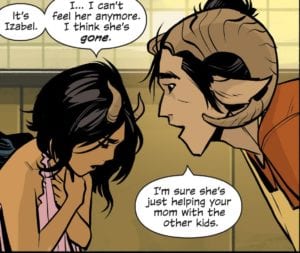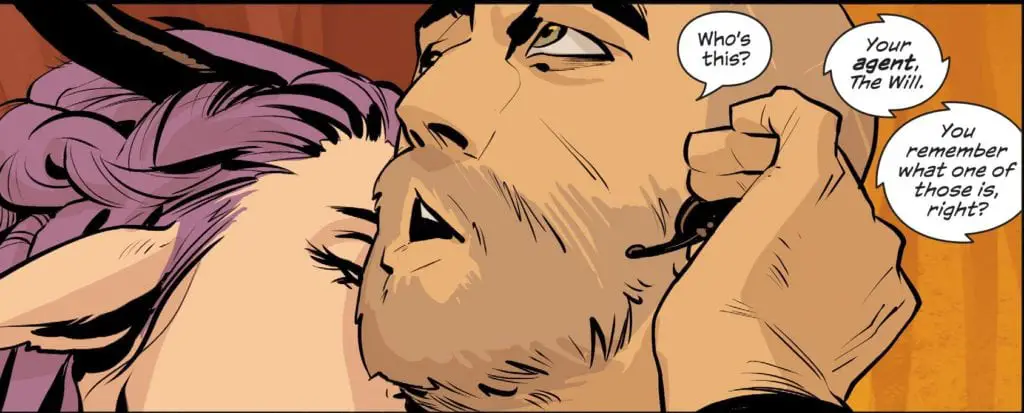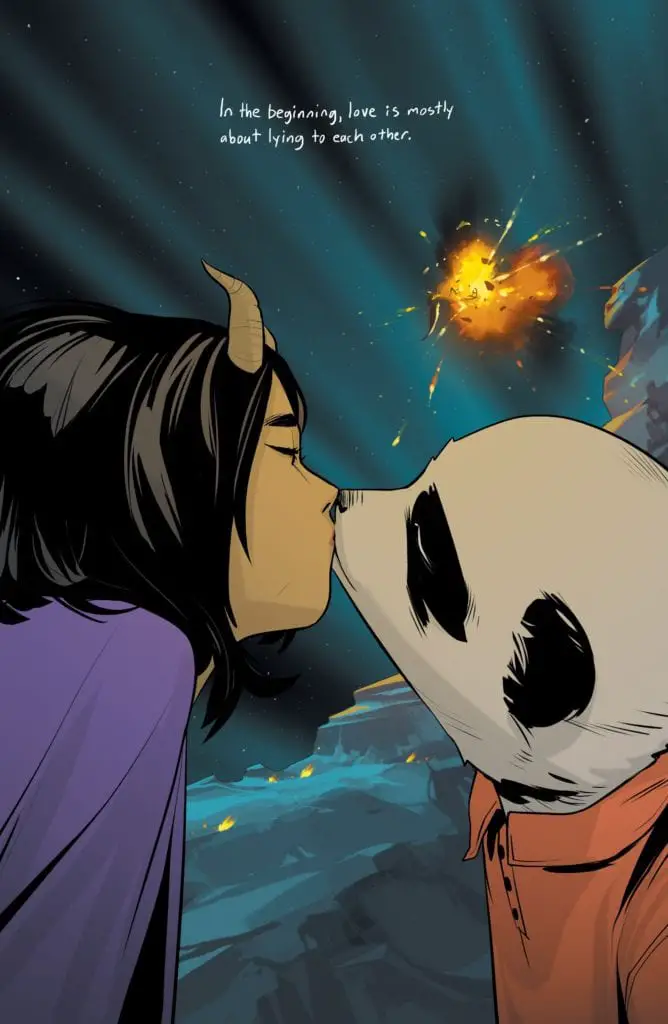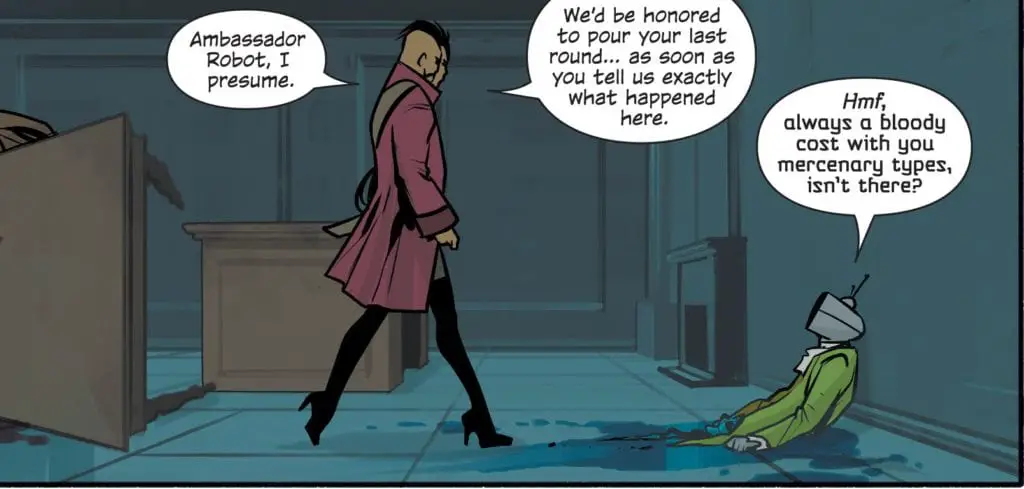Once upon a time, somebody said “childhood ends when you understand death.” We’ve all heard this; we all know this to be true. And even the first time we hear this is like a reckoning, a threshold we cross and can never return from again, since there’s really no choice but admitting it. My first time hearing it came from Michael Wincott in The Crow, and it’s the kind of sound you cannot argue with. But enough about me and my irretrievable innocence. This is about Hazel and her coping with one of life’s most daunting milestones: the pain of loss.
Although Alana and Marko’s beloved child still has years of innocence ahead, this issue marks a definite change in her character. These turning points are always kind of a big deal, especially when it’s about one who has the galaxy in a tempest of blood, knickers, and fire.
Issue #39
“I… I can’t feel her anymore.”
Guns have two main, not necessarily exclusive, ends in comics, films, video games, and the like. One is to kill characters; two is to end up in the wrong hands. Saga has already shown us a wide palette of situations where kids can find themselves in danger, except for that scenario where they endanger themselves. That’s how local Phang kid Kurti and his friends have us covered by coming upon a rifle. In fiction (and unfortunately in real life as well), guns can become toys in children’s hands until suddenly they’re not anymore, often resulting in regrettable outcomes. Fortunately for this mischievous bunch, there is a responsible adult around: Alana and her foul mouth, which amusingly is what causes the more impactful impression on the kids.
As a nod to her past as a Landfall soldier, Alana demonstrates some knowledge on the weapon’s handling. Although our current pregnant rogue is a far cry from the small cog in the Landfall’s war engine, some facets in her history die hard. This is just as well since they play into her competence for survival, a necessary asset for each arc. Leaving that aside, she considers not telling Kurti’s grandma about the children’s careless mischief, so long as they know how to give a proper swollen feet rub. Her daughter’s cry snatches her attention, however.

Thus, as Hazel runs into the kitchen/dining room, we are forced to pick up the pieces from last issue’s tragedy: Izabel’s death by diabolus-ex-nihilo. At this time, her only knowledge of the fact comes from instinct—the severing of that ethereal tie that connected Izabel and her. Petrichor and Marko don’t seem too preoccupied, but Sir Robot’s unsure gesture doesn’t go unnoticed by Hazel’s dad. Sir Robot sees minuscule danger in sending ghost babysitter on what would otherwise be a suicide mission. After all, ghosts can’t die, can they? However, Jebarah remarks that not even ghosts can live indefinitely. As a consequence, Hazel mourns, regretting that she behaved so badly the last time she spoke to Izabel.
Well, that’s just like pouring salt on the open wound, isn’t it?
Marko insists Izabel must simply be lost somewhere and prepares to go search for her. However, Petrichor insists on going instead since Marko is a wanted man, and their current location does them little favor in that regard. That’s a buddy, however sour.
Before going on the search proper, there is something to note here. A remark from Marko about the time they escaped the timestuck causes particular interest for Jebarah. Or rather, it unleashes a kind of discourse Petrichor is rather fed up with. From this brief moment, we learn that Jebarah is a deeply pious individual. The kind of pious with devotion for unseen spiritual forces and stuff. Her set of beliefs is pretty vague and unimportant in itself. But, this will play an important role in the future.
Meanwhile in Wreath, we join The Will in a lapse of moderate hedonism. Enjoying a hookah and a (presumably) sex worker’s company is definitely a healthier hobby than his past hunt for Prince Robot IV. However, a call from his agent etches a dent in the mood. The Will’s superiors aren’t too happy with how he’s been spending his time. His agent reveals that the union has given Alana, Marko, and Hazel’s gig to more “invested” hands. His expression at learning The March got the job should say whatever Izabel’s murder hasn’t already. But we’ll surely learn more of that, one frightful step at a time.

But let’s not get ahead of ourselves. Circumstance has a few generous helpings of misfortune to heap on The Will’s plate. A big man, presumably the young woman’s pimp, comes in to rough The Will up and (presumably) kill him. As this goes on, his agent informs him he’s fired, which is bad. But more than because of The Will’s stumbles, this is is because the agency, as a whole, isn’t doing too well. Now, it’s certainly amusing to see The Will fighting back (presumably) for his life while his agent calmly speaks. But there is something to consider about the latter’s words more than their contrast with The Will’s current physical struggle.
The Freelancers’ work constitute a shroud of discretion for the political powers that be. Yes, it mostly involves death, but it also represents a care to maintain dirty business under wraps and limited within the practical. The Brand’s methods are the best example of this: less is more, sharp and subtle like a needle. If this line of business goes south, it says a lot of what former customers are now willing to do. Unabashed disposition to get one’s hands dirty is the first sign of ruthless means to come. The March is a good example of this new preference. It’s basically the coherence of ‘no country for old men’. The Will simply has no future in this new direction. So dies The Will. Meet Billy.

He can no longer legally kill people, so his spear no longer works. Still he managed to fend off the (presumably) pimp-ish fellow. He has that going for him at least; Billy remains a wild card.
Back on Phang, Hazel looks understandably despondent about the latest turn of events. Despite her father’s certainty, she has no confidence Petrichor will succeed in finding her. When approached by Kurti that night, Hazel engages into a rather interesting development, mostly touched by a cruel irony. Hazel has been close to death so many times, yet only now has experienced it through loss by Izabel’s death, one whom we believed could not die. Beside the pain of loss, this puts other things into perspective, such as the notion of an afterlife, but not quite that. Rather the notion of afterlife as an artificiality, a fancy, a fiction, a beautiful lie.
Therefore, by suffering the loss, Hazel now questions the worth of other fictions, such as the in-universe’s variant of the Tooth Fairy. Kurti, being raised under a vastly different worldview, doesn’t see these fictions as a worthless artifice, something Hazel finds rather naive, though Kurti still exhibits some wit rooted in logic. The conversation ends with the first kiss in their lives. While this is something of a sweet little moment, it’s also an extension of that game of fiction and significance they were carrying out earlier. Hazel’s narration in retrospective essentially confirms this by declaring that love begins with a degree of falsehoods.
Profound, and possibly true, but mileage varies. Doesn’t it?
As we reach this issue’s end, Alana and Marko see Petrichor off on her mission to find Izabel. Sadly, we know already that she’ll come back empty-handed. Although this temporary parting shows little in terms of endearment, we yet see Petrichor acknowledging that Alana has a sizable chunk of future to prepare for.
Meanwhile, in the Robot Embassy, we find the mood countered via the remainders of a grisly massacre. There is one survivor, whom The March interviews while he’s still alive, however brief that will be. This horrendous little scene turns out to be the consequence of a disagreement between the robots…
… a question of whether the plan to exterminate Phang and every creature living on it is the most sensible course of action or not.

Saga Issue #39 Credits
Writer: Brian K. Vaughan
Artist: Fiona Staples

